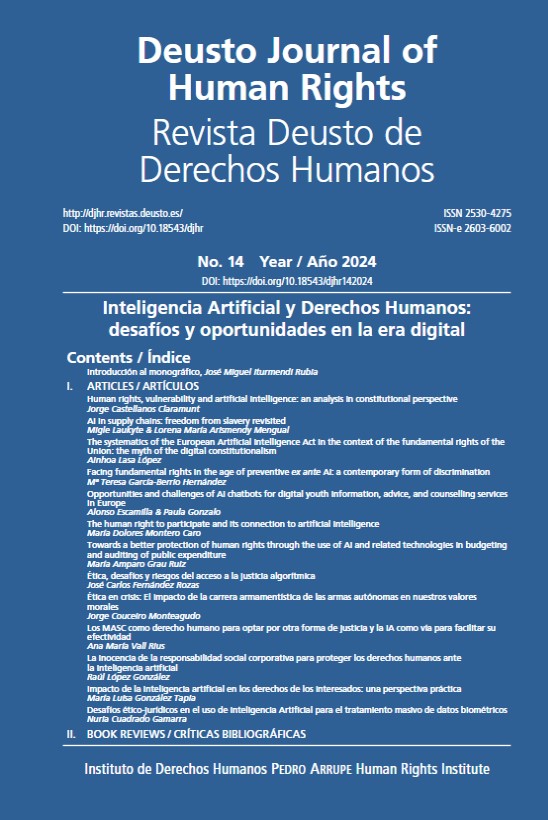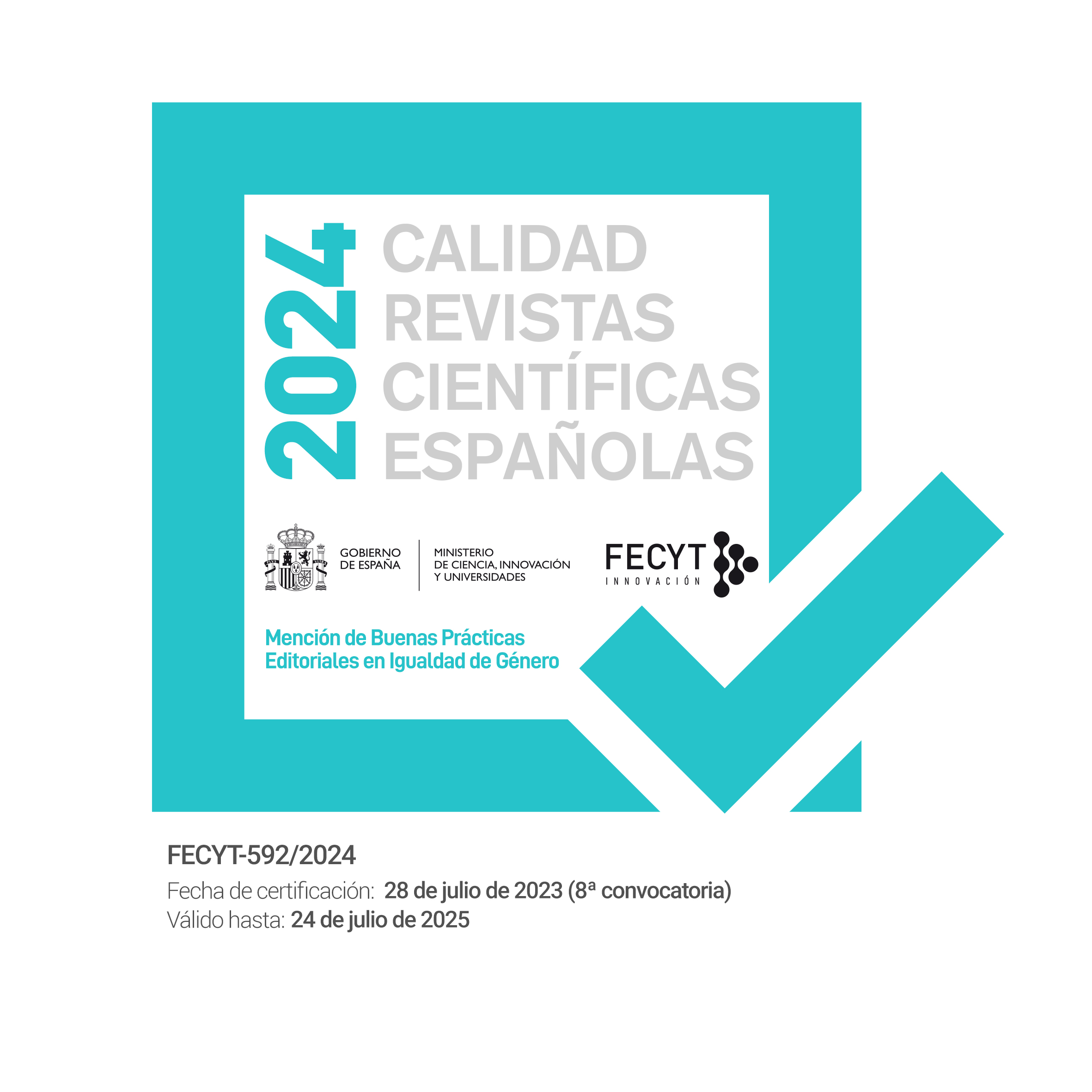Facing fundamental rights in the age of preventive ex ante AI: a contemporary form of discrimination
Abstract
As Artificial Intelligence (AI) systems become increasingly integrated into the social fabric of contemporary communities, ethical considerations surrounding their impact on fundamental rights have come to the fore. Indeed, the growing significance of AI has recently prompted a pivotal discourse within academic and policy circles in Europe concerning the development of an ethical framework for human-centric AI. As part of a broader research project examining the implications of AI on fundamental rights, particularly the right to non-discrimination, our objective is to present a preliminary overview of fundamental rights’ risk management in the context of AI. In light of the significant impact of AI on vulnerable individuals and minorities, our discussion will subsequently address critical areas of concern related to the EU AI Act, including algorithmic bias and its constituent elements of discrimination based on ethnicity or religion.
Received: 06 June 2024
Accepted: 22 November 2024
Downloads
References
Añón, María José. 2022. «Desigualdades algorítmicas: Conductas de alto riesgo para los derechos humanos.» Derechos y Libertades 47 (1):17-49.
Bauman, Zygmunt. 2003. Modernidad Líquida. Buenos aires: Fondo de Cultura Económica.
Beauchamp, Tom. 2003. «The nature of applied bioethics.» In A Companion to applied ethics, edited by Roger Frey & Christopher H. Wellman, 1-16. Malden: Blackwell Publishing.
Beauchamp, Tom and James Childress. 1994. Principles of biomedical ethics. New York: Oxford University Press.
Beck, Ulrich. 2008. La sociedad del riesgo mundial: En busca de la seguridad perdida. Barcelona: Paidós.
Beck, Ulrich and Elisabeth Gernsheim. 2003. La individualización: El individualismo institucionalizado y sus consecuencias sociales y políticas. Barcelona: Paidós.
Berk, Richard, Hoda Heidari, Shahin Jabbari, Michael Kearns and Aaron Roth. 2018. «Fairness in criminal justice risk assessments: The state of the art.» Sociological Methods and Research 50 (1): 1-24.
Castellanos, Jorge. dir. 2023. Inteligencia artificial y democracia: Garantías, límites constitucionales y perspectiva ética ante la transformación digital. Barcelona: Atelier.
Cortina, Adela. 2007. Ética de la razón cordial: Educar en la ciudadanía en el siglo XXI. Madrid: Nobel.
Cortina, Adela. 2011. Neuroética y neuropolítica: Sugerencias para la educación moral. Madrid: Tecnos.
Ganty, Sarah and Juan Carlos Benito. 2021. Expanding the list of protected grounds within anti-discrimination law in the EU. Brussels: Equinet.
García-Berrio, Mª Teresa. 2023. «La sociedad digital como cultura del riesgo: Desafíos éticos e implicaciones legales del uso de sistemas de Inteligencia artificial para la evaluación de riesgos y la vigilancia preventiva.». In Inteligencia artificial y Democracia: Garantías, límites constitucionales y perspectiva ética ante la transformación digital, edited by Jorge Castellanos, 39-65. Barcelona: Atelier.
Gerards, Janneke and Raphaele Xenidis. 2021. Algorithmic discrimination in Europe: Challenges and opportunities for gender equality and non-discrimination law. European network of legal experts in gender equality and non-discrimination. Luxembourg: European Union.
Hackers, Philipp. 2018. «Teaching fairness to artificial intelligence: existing and novel strategies against algorithmic discrimination under EU law.» Common Market Law Review 55 (4): 1143-1186.
Jonas, Hans. 1995. El principio de responsabilidad: Ensayo de una ética para la civilización tecnológica, Barcelona: Herder.
McCrudden, Christopher. 2008. “Human dignity and judicial interpretation of human rights”. European Journal of International Law 19 (4): 655–724. doi.org/10.1093/ejil/chn043
Makonnen, Timo. 2007. Measuring Discrimination: Data collection and EU Equality Law: Thematic Report of the Group of Independent Experts. Brussels: European Commission. Access December 9, 2024. https://www.andis.odihr.pl/bitstream/20.500.12389/19825/1/03245.pdf.
Raz, Joseph. 1986. The morality of freedom. Oxford: Clarendon Press.
Savater, Fernando. 2011. Ética a Amador: Una invitación a vivir sin odio ni miedo. Barcelona: Ariel.
Soriano, Alba. 2021. «La propuesta de Reglamento de Inteligencia Artificial de la Unión Europea y los sistemas de alto riesgo.» Revista General de Derecho de los Sectores Regulados 8 (1): 50-63.
Soriano, Alba. 2023. «Creando sistemas de Inteligencia Artificial no discriminatorios: Buscando el equilibrio entre la granularidad del código y la generalidad de las normas jurídicas”. IDP Revista De Internet, Derecho y Política 38: 1-12. https://doi.org/10.7238/idp.v0i38.403794.
Young, Robert. 1980. «Autonomy and Socialization». Mind 89 (356): 565-576.
Žliobaité, Indre and Bart Custers. 2016. «Using sensitive personal data may be necessary for avoiding discrimination in data-driven decision models.» Artificial Intelligence & Law 24 (2): 183-201. https://doi.org/10.1007/s10506-016-9182-5.
Zoboff, Shosana. 2020. La era del capitalismo de la vigilancia: La lucha de un futuro humano frente a las nuevas fronteras del poder. Barcelona: Paidós.
Deusto Journal of Human Rights / Revista Deusto de Derechos Humanos is an Open Access journal; which means that it is free for full and immediate access, reading, search, download, distribution, and reuse in any medium only for non-commercial purposes and in accordance with any applicable copyright legislation, without prior permission from the copyright holder (University of Deusto) or the author; provided the original work and publication source are properly cited (Issue number, year, pages and DOI if applicable) and any changes to the original are clearly indicated. Any other use of its content in any medium or format, now known or developed in the future, requires prior written permission of the copyright holder.



3.jpg)
3.jpg)
3.jpg)
.jpg)








